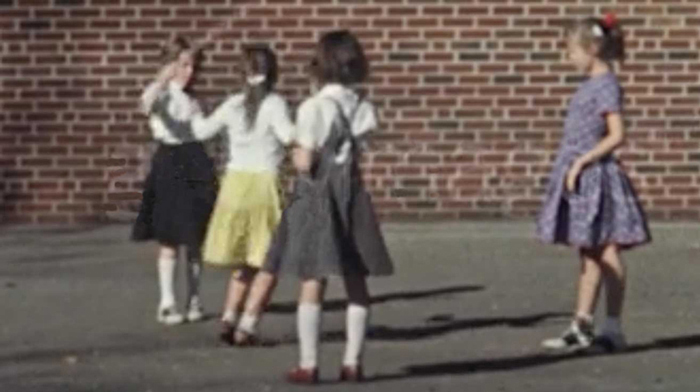
They jumped Double Dutch, while we jumped single line. They were wiry, athletic, and they kicked up their legs so high between the dicing ropes that sometimes we saw their underpants.
We were always orderly. We jumped one at a time. They clustered around their ropes in hungry packs, daring each other to leap into the mix. Sometimes two, three of them would jump in together, and they’d be all knees and elbows, until one’s hand or foot caught the edge of the rotating hemp and stopped it cold. Their coarse hair was wound into funny balls.
When we jumped, we kept our feet and knees together, moving slow, our leather shoes kissing the pavement and hop-skipping over the rope. We took turns. We counted every jump and strove to reach 100. Often, a teacher turned rope for us. Sometimes a quiet one would wander over and watch, like she didn’t understand the purpose. Sometimes it seemed she just wanted a closer look at our clothes, hair, and skin.
Dina Vanderbeek said they smelled different, like dried sweat on your daddy’s cotton tee shirt, and that they weren’t as good as we were. And we whispered that they peed on toilet seats. Yet, we eyed their speed, their lithe tripping through ropes, limbs spinning like electric cake mixers, those dancing, dark marionettes without strings.
In 1960, we all smelled so pretty. Our sheer floral dresses with puff sleeves defied gravity, ballooning over our petticoats. Our pigtails were perfect, our bangs straight and wisp-free. Freshness was our mission. Our thoughts, like our hands and our faces and our rosebud underpants, were sanitary. At home, we moved among germ-resistant Formica counters, pastel bathroom fixtures, a stainless-steel sink with garbage disposal and an electric range. The panel lights on our new gleaming washers and dryers were fluorescent. Cool, blue, and subdued, fluorescence reflected off the white enamel surfaces, validating our decorative plastic plants, those still lifes that preserved our world view, one of science and safety in our homes. Our appliances, like new religions, made our lives whole. Modern, clean, and white was a state of mind in which virtue took up residence. We lived in the Midwest, the land of hard work and good people. Immigrants. Germans, Poles, Norwegians next door. And Irish Catholics lived down our block.
We also had slums. That’s where they lived. We shared our north Rockford elementary school with them, but not our classrooms. Theirs were in the brown cement basement, where we ducked and covered once a month. They came to our neighborhood each day on busses for integration, and left the same way. In the lunchroom, they sat at their own tables. My mother said busing was the law and that we should be nice to them because they were poor, but that we didn’t have to eat with them. I ate with Antoinette and Debra, girls in my Brownie troop. There weren’t any of them in there. I wasn’t sure why, but someone said they couldn’t afford the uniforms.
My parents knew a nice one who rented a flat in my uncle’s property, and they took us over to her one December evening so she could babysit my brother and me. In her small living room, we danced to the music in her huge hi-fi. She was playing rock’n’roll. ‘Y’all like this music?’ she asked me. I nodded. ‘This’s Little Richard. Y’all can dance?” she asked, twirling me around like the ballerina in a jewelry box and laughing; Oh how she laughed, a great deep roar from behind a Santa stomach. She was a laugher. Miss Elsie was her name.
